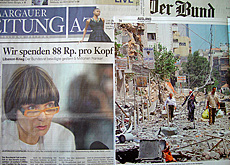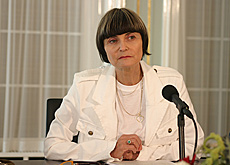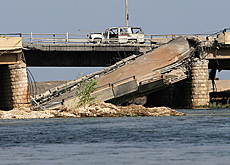Split cabinet buries its head over Lebanon

A special cabinet session to discuss the bloody Lebanon crisis produced an additional SFr5 million ($4 million) in humanitarian aid but little else.
In an interview with swissinfo, political scientist Georg Lutz says ministers are divided on what the depositary state of the Geneva Conventions should be doing – or saying.
After hostilities between Israel and Hezbollah broke out on July 12, the Swiss foreign ministry was quick to take a firm line.
On several occasions Foreign Minister Micheline Calmy-Rey and her officials criticised Israeli aggression as “disproportionate”, while also condemning Hezbollah rocket attacks.
Two weeks into the crisis, the rest of the cabinet interrupted their holidays on Wednesday to conduct “intensive talks” on the situation in the Middle East. The result was more aid and a strange silence – no condemnation of Israel or Hezbollah, and no calls for a ceasefire.
“Switzerland is limiting itself to a humanitarian perspective and is going to continue in that direction,” announced Calmy-Rey after the meeting.
The Swiss Federation of Jewish Communities called the cabinet’s change of position an attempt to correct the foreign ministry’s earlier criticism of Israel.
The federation said Calmy-Rey’s use of the word “disproportionate” had put the blame entirely on the Jewish state for the hostilities, ignoring the cause of the outbreak of violence.
swissinfo: Why did the cabinet fail to take a firm position on the conflict?
Georg Lutz: As far as I read it, they couldn’t agree on a more substantial statement regarding the conflict. This means they could neither stick to what has been said by the foreign ministry nor could they find any other response to what’s going on. The result was that they seem to have decided to say nothing about it.
It shows one of the weaknesses of the Swiss governmental system: that it is impossible to take a lead on any international issue. Saying nothing to this situation is, in my view, a rather weak statement.
swissinfo: Over the past few weeks the Swiss foreign minister has been fairly outspoken. Now she says she will be focusing on the “humanitarian perspective”. Has she been muzzled by her cabinet colleagues?
G.L.: I don’t see any other way of interpreting it, because she has been quite clear in the past – and has been criticised for this – and now she has officially said she is not going to say anything about the conflict anymore. So the only possible explanation is that the government, as a joint body, has decided not to follow the line of argument she has used before.
swissinfo: It has been suggested that the seven-strong cabinet, which is dominated by politicians from the centre-right, is reluctant to criticise Israel – or is even pro-Israeli. Is there any truth in this?
G.L.: I don’t see it like that. My interpretation is that they have decided to go back to the old notion of Swiss neutrality during the Cold War, which was to say nothing about what was going on in the world.
But in fairness this difficulty to formulate a clear position is not unique to Switzerland. Across Europe, many other countries are struggling as well.
swissinfo: Under Calmy-Rey, the Swiss foreign ministry has pursued a more active diplomatic line than in the past. Does this mark the end of that?
G.L.: Not in the long term. The old definition of neutrality is not going to work in the future, if Switzerland aims to play some role in the international community. Of course there are forces – and they seem to be in a majority – who don’t want this at all. The only Swiss foreign policy they want is one that guarantees business interests. But I don’t think this is a good long-term strategy, because Switzerland would have even less standing than it has now.
swissinfo: The UN has described the bombing of civilian targets as “a violation of humanitarian law”. Should Switzerland, as the depositary state of the Geneva Conventions, also be taking a tougher stance?
G.L.: The public is fairly divided – and so are news commentators. Some say it was right to stop criticising so strongly; others argue that the defence of human rights and international humanitarian law is one of the cornerstones of Swiss foreign policy. In this sense, it was logical and even coherent for the foreign ministry to criticise what’s going on in Lebanon.
But no one will really notice in the international community, because the relevance of what Switzerland says or does is overrated back home.
swissinfo-interview: Adam Beaumont
The Swiss government announced on Wednesday that it is to contribute a further SFr5 million ($4 million) in humanitarian aid as a result of the ongoing crisis in Lebanon.
The money will go to the Swiss-run International Committee of the Red Cross for its emergency activities.
The government abstained from explicitly criticising Israeli attacks as “disproportionate”, as the foreign minister had done a week ago.
The political parties represented in government for the most part backed Wednesday’s decisions. However, the centre-left Social Democrats said the approach was too passive.
The foreign ministry has helped 875 people leave Lebanon.
This figure includes 795 Swiss and 80 foreigners with residence in Switzerland.
A further 215 Swiss have said they don’t want to leave Lebanon.
The evacuation programme has so far cost SFr2.5 million.

In compliance with the JTI standards
More: SWI swissinfo.ch certified by the Journalism Trust Initiative


You can find an overview of ongoing debates with our journalists here. Please join us!
If you want to start a conversation about a topic raised in this article or want to report factual errors, email us at english@swissinfo.ch.